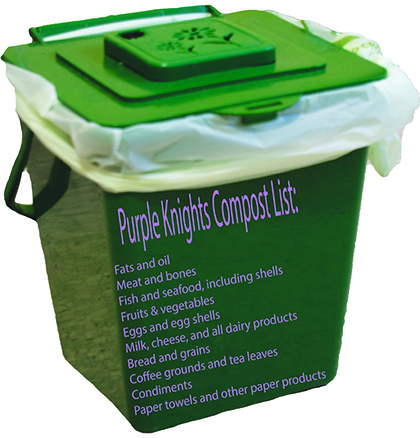
By Isabella Davitt
Staff Writer
Composting is not a new system here at Saint Michael’s College. So why, more than seven years later, are we still having problems with what should be a simple system?
Since 2007, all consumer food scraps from Alliot have been composted. In 2012, the Vermont Legislature passed Act 148, making it mandatory for all students and employees on campus to compost. But the campus community’s knowledge and commitment to composting needs to catch up with the regulations. Compost is decomposing organic matter such as food and plant scraps.
Compost is currently collected from Alliot, the green compost bins located around campus, and from landscaping projects. This organic matter is then brought to our compost pile which is located across the street and down the hill not far from the view. “Composting keeps valuable, nutrient-rich organic material out of landfills and instead creates fertilizer, useful for gardens and landscaping,” said Doug Facey, a professor of biology and chair of the Sustainability Committee here on campus. If these materials were put in the landfill, they would take up space, and release methane, a powerful greenhouse gas, into the atmosphere.
I compost at home because I have a bin right in my kitchen but I don’t when I come to school because it’s not as convenient”
Julia Fitzgerald ’22
Since the compost pile here at the college isn’t industrial-sized, it doesn’t get to a high enough heat, which makes it harder for some material to break down. We are part of an exchange with Green Mountain Compost. “Our partially decomposed material goes to Green Mountain Compost where it can be fully broken down. In exchange, St. Mike’s receives finished compost to apply to our grounds and the farm,” Facey said.
The size of our compost pile isn’t the only issue surrounding the system. There is also a lack of knowledge and care for compost. Julia Fitzgerald,’22, said “I don’t think the composting system is effective because a lot of food and other things, like paper towels, just end up in the landfill.” Yet paper towels used on campus can be composted, along with napkins and other paper products.
Some students compost regularly at home but find it difficult when they are at school because of the lack of resources, in this case, compost bins. “I compost at home because I have a bin right in my kitchen but I don’t when I come to school because it’s not as convenient,” Mikaela Dorsey,’22, said.
Lack of compost bins in high trafficked areas such as Einsteins and the academic buildings is part of the problem with composting on campus, said Facey. He believes that there are misunderstandings on campus of what can, and should be composted. There is also a carelessness associated with the compost system. People often opt to toss their scrap food into the trash instead of walking down the hall to the compost bin, said Facey.
“Composting reduces waste going into landfills and it provides nutrients to enrich our soils. That’s worth a few extra steps to put that banana peel or apple core into a green bin,” Facey said.

